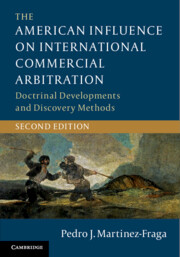
- Publisher:
- Cambridge University Press
- Online publication date:
- June 2020
- Print publication year:
- 2020
- Online ISBN:
- 9781316585009

As in its first edition, this book traces the contours of select US common law doctrinal developments concerning international commercial arbitration. This new edition supplements the foundational work contained in the first edition in order to produce a broader and deeper work. The author explores how the US common law may help bridge cross-cultural legal differences by focusing on the need to address these contrasting approaches through the nomenclature and goal of securing equality between party-autonomy and arbitrator discretion in international commercial arbitration. This book thus focuses on the common law development of arbitrator immunity, as well as the precepts of party-initiative and –autonomy forming part of the US common law discovery rubric that may contribute to promoting expediency, efficiency and transparency in international commercial arbitration proceedings. It does so by carefully analyzing, among other things, the International Bar Association (IBA) Rules on Evidence Gathering, the Prague Rules, and the role of 28 USC. §1782 in international arbitration.
'A thoughtful and provocative analysis of a very timely subject - replete with keen observations and original analysis.'
Gary Born - Wilmer Cutler Pickering Hale and Dorr, LLP
'The US law of international commercial arbitration has commonly been viewed as less than fully coherent. This is regrettable, given the great importance of US law in this field and its proper understanding, including from abroad. The first edition of The American Influence on International Commercial Arbitration admirably filled the gap, but galloping legal developments require a fresh account. Happily, with a second edition of the book, the gap remains once again admirably filled.'
George Bermann - Columbia University, director, Center for International and Commercial Arbitration
'Pedro J. Martinez-Fraga begins his masterful work on the United States’ influence on international commercial arbitration with the original vision of arbitration suggested by Goya’s painting 'Duel with Clubs' in the Museo del Prado. The idea that arbitration is as blunt an instrument for ‘dispute settlement’ as two men using deadly force against each other - admittedly efficient, expedient, and final - has, he says, been eclipsed by the recognition that arbitration has much in common with judicial proceedings. His book is an argument, driven by a careful examination of history, case law, and statute, that the actions and views of common law courts has had much to do with this change. His is general (and rare) defense of what some would decry, namely the 'Americanization' of international arbitration. Readers should welcome this new up-to-date edition. It continues to be a valuable contribution to a healthy, ongoing debate.'
José E. Alvarez - Herbert and Rose Rubin Professor of International Law, New York University
'Pedro J. Martinez-Fraga’s second edition of The American Influence on International Commercial Arbitration is a must-have addition to one’s collection of books on international arbitration. Its thoughtful analysis of the common law development of different aspects of international arbitration leads to a depth of understanding and appreciation of complex issues that regularly arise in the field. Whether or not one agrees with all of Mr. Martinez-Fraga’s conclusions, his insightful and rigorous analyses ensure that time focused on reading this book is time well-spent.'
Margaret L. Moses - Mary Ann G. McMorrow Professor of Law, Director of International Law and Practice Program, Loyola University Chicago
‘This is, unmistakably, the book of a scholarly pragmatist, for whom the promise of international arbitration still holds resonance and who identifies the threats to its legitimacy with accuracy and intelligence.’
Sophie Nappert Source: Transnational Dispute Management
 Loading metrics...
Loading metrics...
* Views captured on Cambridge Core between #date#. This data will be updated every 24 hours.
Usage data cannot currently be displayed.